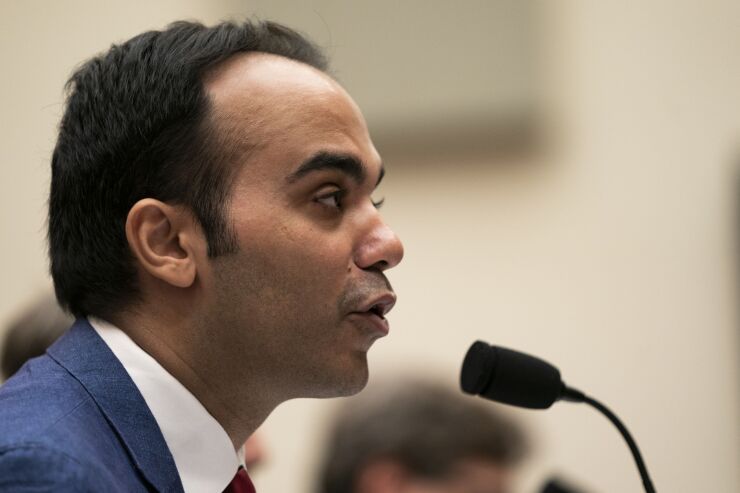The Consumer Financial Protection Bureau is expected to seek to lower the cap on credit card late charges to safeguard cardholders from excessive fees imposed by issuers and from the effects of inflation.
Such a move would dovetail with CFPB Director Rohit Chopra's pledge to crack down on what he calls “junk fees,” or charges that he says don't correlate with the underlying costs of products or services.
Bankers now expect the CFPB to reset the maximum allowable amounts for late fees, which could drop a few dollars from the current limits of $30 for first-time late fees and $41 for recurring fees.
“It’s one area where the CFPB can actually set fees,” said David Pommerehn, general counsel and senior vice president at the Consumer Bankers Association. “The bureau has the authority to set the ‘safe harbor’ limits on late fees under the CARD Act and lower those from where they currently sit. They can change those safe harbors."

When consumers fail to pay a credit card on time, the late fee gets added to the balance and compounded over time. Consumers who are perpetually late paying a credit card bill incur late fees that compound over years. The CFPB says that penalty fees can represent a surcharge of 24% annualized on top of assessed interest on unpaid balances.
Nearly all major credit card companies are bumping up against the maximum limits for late fees allowed by the Credit Card Accountability Responsibility and Disclosure Act of 2009, known as the CARD Act.
In a
“They’re clearly scared that given our inflation numbers, it's going to allow those one-month and six-month late fee limits to materially increase," said Stephen Dollar, co-head of U.S. financial institutions at Norton Rose Fulbright. “It sets up an unusual dynamic as we've never really lived in the modern era with a highly inflationary environment together with high interest rates, low unemployment and rising wages.”
Questionnaires sent to banks in recent months seek information about loans to same-sex couples, women on maternity leave and people with limited English proficiency. Industry executives and attorneys say the Consumer Financial Protection Bureau may be offering hints about specific types of fair-lending cases it could pursue.
The CFPB is required under the CARD Act to consider an annual adjustment to the maximum allowable late fee amounts. Its easiest step would be to adjust the limits downward. Some observers think the CFPB could try to remove late fees entirely from safe-harbor protections.
The Federal Reserve originally had authority to set the annual late fee adjustment but responsibility transferred to the CFPB under the Dodd-Frank Act of 2010.
A big concern ahead is how the CFPB will act on the comments received in its broad
Fee charges and disclosures in banking are heavily regulated at the federal and state levels. But some see other factors at work in the CFPB's request for information on fees.
A CFPB spokeswoman said the bureau has authority to regulate fees under a variety of statutes including the Consumer Financial Protection Act, which prohibits “unfair, deceptive, and abusive acts or practices,” known as UDAAP violations.
Under Chopra, the CFPB has said protecting vulnerable and minority populations will be a priority. The CFPB claimed in its credit card report that late fees fall disproportionately on lower-income consumers with subprime credit scores. It found that low-income areas and poor neighborhoods “bear more of the late-fee burden.”
“Late fees are assessed for not paying a charge after a grace period, and they are well understood by consumers and embedded in federal and state law and regulation, so making the case that late fees violate federal law has proven difficult for the CFPB,” said Jeff Naimon, a partner at the Buckley law firm.
Many banks, lenders and card issuers are concerned that the CFPB plans to use its UDAAP enforcement authority to allege that late fees are discriminatory. Last month the CFPB asserted for
“The CFPB’s argument is that the disproportional effect of late fees on protected minority consumers is evidence of discrimination, and its updated exam manual stating that discrimination is ‘unfair’ creates the hook that the CFPB needs to allege a violation of federal law,” Naimon said.
Some experts noted that the CFPB often releases a report, a blog post or other guidance ahead of an enforcement action, and they predicted that a flurry of consent orders is coming.
“When the CFPB comes out with stuff, usually something follows,” said Lucy Morris, a partner at Hudson Cook and a former CFPB deputy enforcement director.
Experts point to a ruling last week by the Federal Trade Commission as an example of how Chopra, who was a Democratic commissioner at that agency and was a mentor to current FTC Chair Lena Khan, might take action.
The FTC and the state of Illinois ordered the owner of eight auto dealerships to pay $10 million for what
The FTC called “add-on” products such as payment insurance or car-paint protection “junk fees,” that were not authorized. Though the FTC voted 4-0 to impose the $10 million penalty, Khan and FTC Commissioner Rebecca Kelly Slaughter issued a
“It shows you that Khan and Chopra, the CFPB and the FTC, are in sync,” on these issues, Morris said.
Some suggest that the CFPB risks an industry lawsuit if it seeks to change late fees.
"If [Chopra] starts adjusting the late fees of any type, he's going to get a court challenge," Dollar said.






